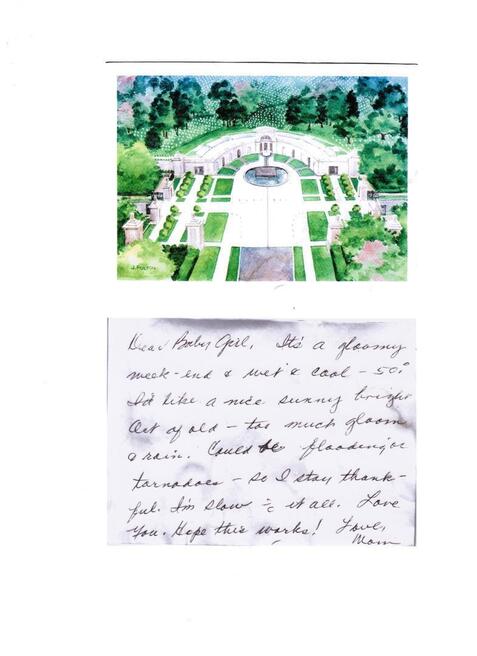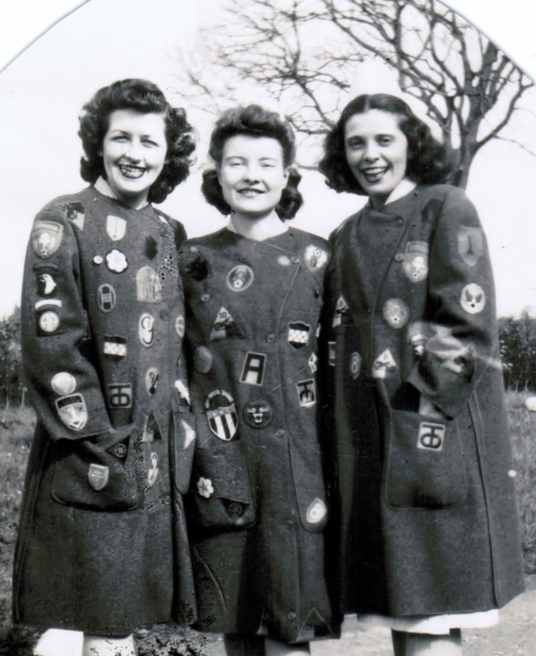John Clayton's In the City: WWII nurse cherishes coat of many colors
By JOHN CLAYTON
New Hampshire Union Leader Staff
Yes, I know that we observed Veterans Day a little more than a week ago, but one thing I've learned is that you can't sit on a good veterans story, especially when it involves a veteran of World War II.
They're leaving us with ever-increasing frequency, so when one of them is good enough to share his or her stories, I try to be there to listen.
Listening to Trudy Greig is a hoot.
Trudy's 93 -- "But I'll be 94 on July 7," she happily pointed out -- and she's crammed a lot of living into those 93 years.
The years we focused on were those she spent as a nurse with the United States Army. She started as a civilian, working at Columbia Presbyterian Hospital in New York, but in 1942, Uncle Sam issued a call for medical personnel, so Trudy enlisted and was commissioned as a second lieutenant.
"I was all the way out in California when they decided they were going to ship us overseas," she said. "We took a train all the way across the country and when we got to New York, they put us on a ship to England. We found out later that the ship had once been used to transport gold."
The nurses bound for the 159th General Hospital were equally precious cargo, and after safely traversing the U-Boat laden Atlantic, Trudy and the rest of her unit found themselves in Yeovil, England.
"There was a building that had been a recruiting station and they asked us to turn it into a hospital," she said. "The soldiers did most of the work on that but they had all these old sewing machines, so the nurses used them to make bandages and dressings. They weren't electric machines either. They were the kind you had to power with your foot, and because I was the only one who'd had one like it at home, I was the only one who knew how to thread the needles."
In the beginning -- that being the days and weeks before D-Day -- the medical care centered on those who suffered training accidents or the sanitation hazards of life in tent camps.
Trudy Greig (JOHN CLAYTON)
"The poor soldiers would be coming in with head lice and then the chief nurse asked me to start helping the men who had trench foot. All the GIs started calling me 'Trench Foot Trudy.' I didn't mind it though. Anything to bring some laughter to the place."
She laughs about it now, but she was understandably unnerved when a unit of U.S. Army paratroopers descended upon the hospital in need of last-minute sleeping quarters.
"The chief nurse asked me to make up beds on one of the wards, and that's what I was doing when all of these handsome young men started coming into the room. We didn't know it, but they had been out in the field training for a long time and the next thing I knew an apple whizzed past my head, then boxes of cookies were flying around, then more apples so I was ducking behind beds and basically crawled out while they were brawling.
"I called the chief nurse and told her what was happening and she said, 'Do they have weapons?' and I said 'No. They have apples.' Eventually, she sent an officer over there and he broke it up and ordered them to clean the place while I went over to the mess hall and got them to prepare steaks for all of those paratroopers."
After that first exposure to combat, Trudy went back in search of apples, but ... "I don't know where they got them," she said. "We just didn't have apples over there, but when I got back to the ward, they were all gone. They'd cleaned the place top to bottom, even the windows."
She had been stationed at Yeovil for two months. Then came June 6, 1944, and the tenor of her tour of duty took a dramatic turn.
"I was a surgical nurse," she said, "and it was so hard on the poor soldiers. By the time they got to us -- having come back from France across the English Channel -- they were mostly stabilized, but there was still a lot of surgery and for those who weren't badly wounded, a lot of them didn't realize that they'd be going back to the fighting.
"I told one soldier who was headed back that I would pray for him and he said 'With all these men here, how will you remember me?' I said, 'Give me that insignia patch off your uniform and I'll sew it onto my jacket over my heart.'"
It wasn't really a jacket. It was only the liner for a raincoat that Trudy never received, but she has that liner to this day.
It is truly a coat of many colors, because, after that first insignia patch, Trudy went out of her way to gather and collect insignia patches from the many units who came through the hospital. One of those patches serves a very pragmatic -- as opposed to sentimental -- purpose.
"See that black and white Military Police patch down by the hem?" she asked. "The British people were very generous to us and the farmers would send things over to the hospital like eggs. If the night nurse wasn't busy, she could cook eggs for the men and that's what I was doing one night when I burned a hole in the hem of my coat. The MP saw it and gave me his arm patch to cover it up."
Trudy and I covered a lot of ground in the time we were together, and we haven't even touched upon her amazement when she learned that a POW camp for Italian soldiers was just down the road from the hospital.
"At the end of the war, they would bring them to the hospital to do chores. They would call to us, Bella! Bella!" she said with a smile. "Now I know that means 'beautiful.' They were flirting with us."
Alas, we haven't the time or space to address Trudy's time at Tachikawa Air Base in Japan -- that's where she met the handsome Army Air Corps aviator who would be her lifelong love -- or her four children or her time in the Panama Canal Zone, nor have we touched upon the many evocative photos on the wall of her room at the Pearl Manor at Hillcrest Terrace.
Those photos are part of a treasure trove of memories, as is her coat of many colors.



